
Overview
This article highlights five essential SEO ecommerce services that can significantly enhance a brand's growth by improving online visibility and driving organic traffic. By implementing:
- Targeted keyword research
- Optimizing on-page elements
- Practicing technical SEO
- Leveraging content marketing
- Building high-quality backlinks
brands can effectively attract the right audience, enhance user experience, and ultimately increase conversion rates and sales. Each of these strategies plays a crucial role in establishing a robust online presence, ensuring that businesses not only reach their target market but also convert visitors into loyal customers.
Introduction
In the competitive landscape of online retail, the significance of SEO ecommerce services is paramount for brands aiming to enhance visibility and drive sales. By effectively implementing these strategies, businesses can attract a greater volume of visitors while ensuring they reach the right audience, ultimately leading to increased conversion rates. However, in an ever-evolving digital marketplace, brands must navigate the complexities of SEO to maximize growth potential and maintain a competitive edge.
Understand Ecommerce SEO: Definition and Importance
The strategic enhancement of an online shop through SEO ecommerce services is aimed at increasing its visibility in search engine results. This practice is crucial for driving organic traffic, which can significantly elevate sales without incurring additional advertising costs. By grasping the significance of SEO, brands can effectively position themselves within a competitive landscape. Robust SEO strategies not only amplify visibility but also enhance user experience, ultimately leading to . For example, a meticulously optimized product page can draw in more visitors and convert them into customers, thereby boosting revenue.
Incorporating SEO ecommerce services into your ecommerce strategy transcends merely attracting traffic; it focuses on attracting the right traffic. This entails understanding your target audience and tailoring your SEO efforts to meet their needs and browsing behaviors. Brands that prioritize SEO can anticipate a substantial return on investment, as organic traffic typically boasts a higher conversion rate compared to paid traffic.
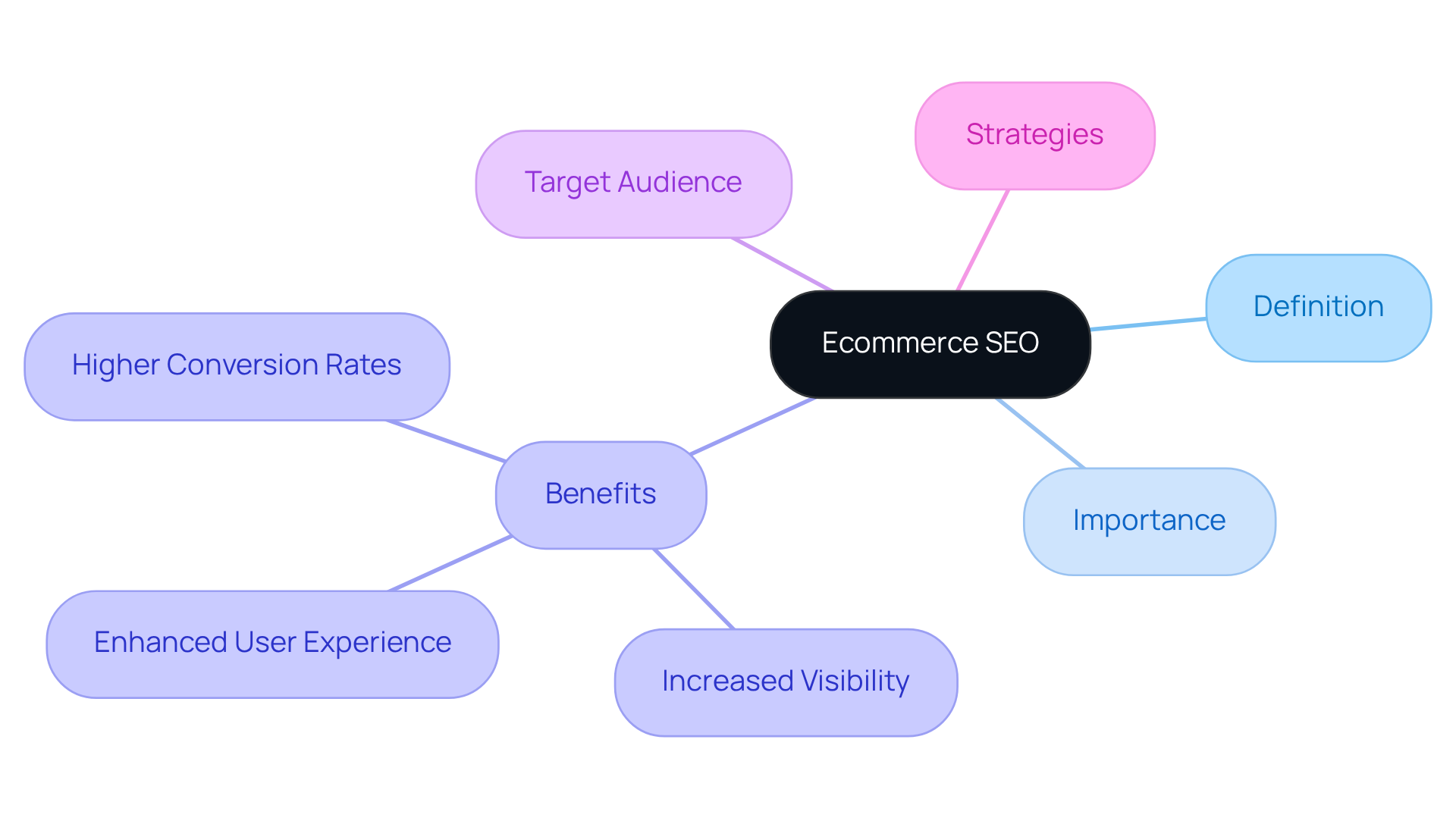
Conduct Targeted Keyword Research for Effective SEO
Conducting focused keyword analysis is crucial for identifying the specific terms and phrases that potential clients are using in online search engines. This process is vital for effectively optimizing your ecommerce site with SEO ecommerce services. Start by leveraging tools such as Google Keyword Planner, SEMrush, or Ahrefs to uncover relevant keywords that boast significant search volume and low competition.
After compiling a list of potential keywords, categorize them based on intent—informational, navigational, or transactional. Prioritize transactional keywords that demonstrate a strong intent to purchase, such as:
- 'buy shoes online'
- 'discount electronics'
By integrating these keywords into your product descriptions, meta tags, and website content, you will enhance your visibility in search result listings through effective SEO ecommerce services. For instance, a direct-to-consumer brand specializing in athletic wear might discover that 'best running shoes for women' is a high-traffic keyword, which they can optimize their product pages around to attract more targeted visitors.
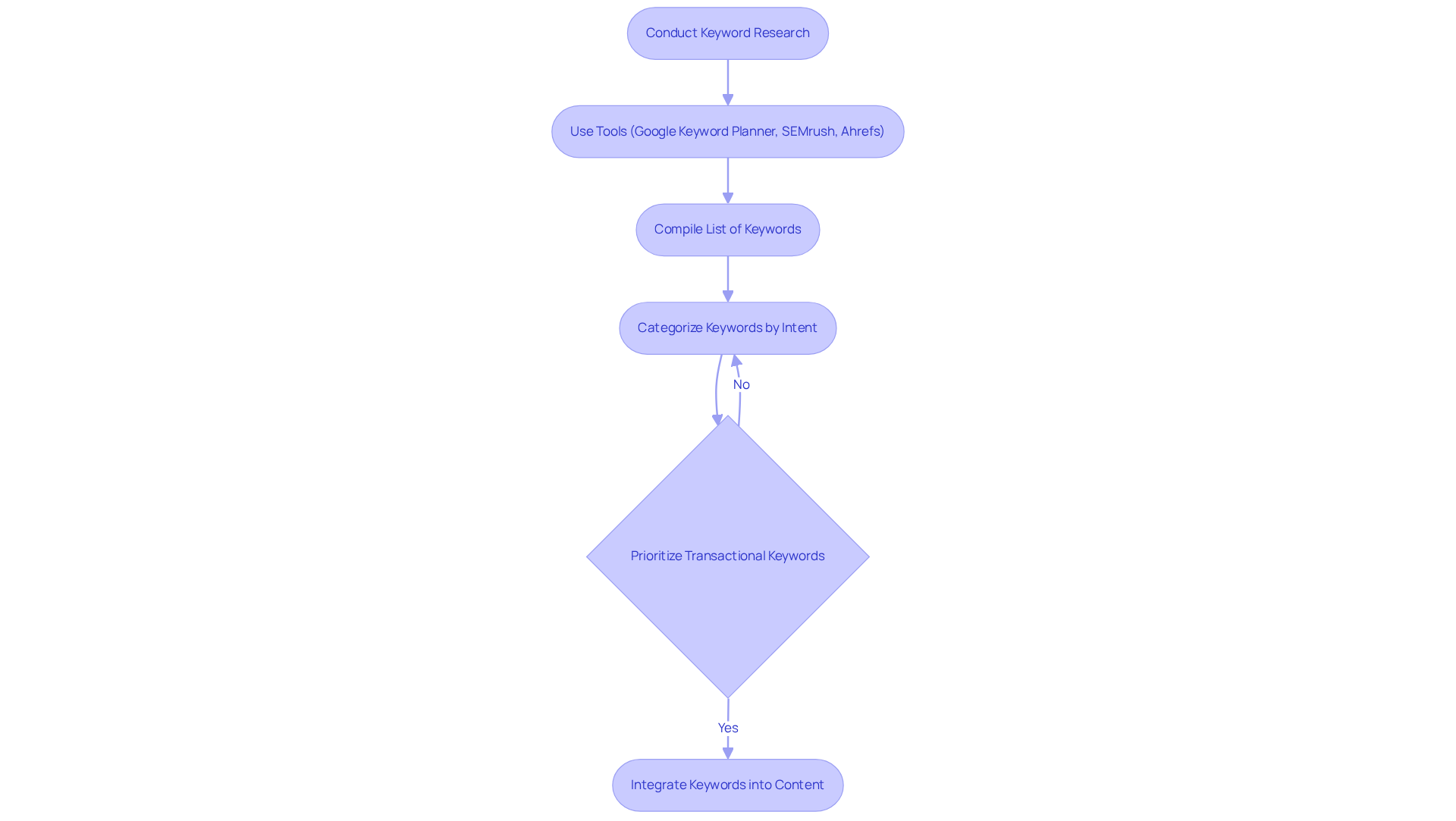
Optimize On-Page Elements for Enhanced Visibility
Optimizing on-page elements is crucial for enhancing the visibility of your eCommerce site. To achieve this, focus on the following key components:
- Title Tags: Each page must have a unique that incorporates your primary keyword. This approach assists search engines in comprehending the page's content, with the highest-ranking outcome on Google achieving an average click-through rate of 39.8%. Notably, the leading organic result garners an average of 19 times more clicks than the top paid result, underscoring the significance of organic visibility.
- Meta Descriptions: Craft engaging meta descriptions that encapsulate the page's information while incorporating relevant keywords. Well-optimized meta descriptions can dramatically improve click-through rates, with snippets capturing 35% of all clicks on search results. Moreover, snippets boast the highest overall click-through rate at 42.9%, making them a vital element of your SEO strategy.
- Header Tags: Implement header tags (H1, H2, H3) to effectively structure your content. The H1 tag should feature the main keyword, while H2 and H3 tags can be utilized for subheadings, thereby enhancing both readability and SEO.
- Image Alt Text: Optimize images by including descriptive alt text that integrates relevant keywords. This practice not only aids SEO but also enhances accessibility, making your platform more user-friendly.
- Internal Linking: Establish a robust internal linking framework to guide visitors through your site and assist search engines in understanding the relationships between pages. Effective internal linking can lead to a 38% increase in pages per session, boosting user engagement. Furthermore, 76% of eCommerce purchases begin with an inquiry, highlighting the critical importance of optimizing on-page elements to enhance conversions.
By prioritizing these on-page elements and utilizing seo ecommerce services, brands can significantly elevate their search engine rankings and improve user experience, ultimately leading to increased conversion rates.
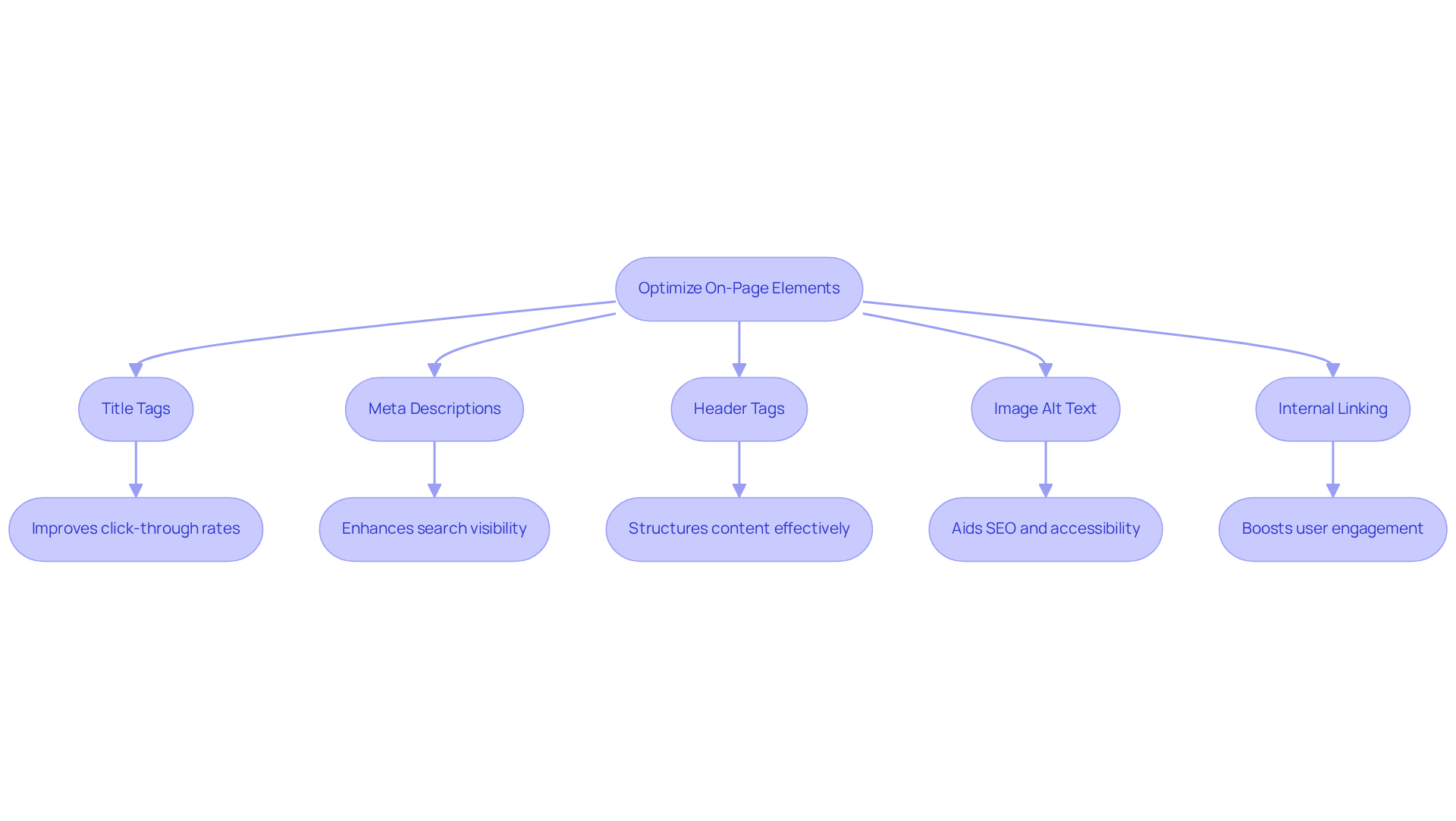
Implement Technical SEO Best Practices for Site Performance
Implementing technical SEO ecommerce services is essential for optimizing the performance of your eCommerce platform. Focus on the following key areas:
- Page Speed: Rapid-loading pages are vital for user experience and SEO. Research indicates that a 1-second delay in load time can , while webpages that load in just 1 second can achieve conversion rates 2.5 times greater than those requiring 5 seconds. Leverage tools like Google PageSpeed Insights to analyze and enhance your webpage's speed.
- Mobile Optimization: With mobile devices accounting for approximately 64% of global web traffic and projected to generate 75% of overall retail eCommerce sales by 2025, ensuring your platform is mobile-friendly is imperative. Implement responsive design to deliver a seamless experience across all devices, as 88% of online shoppers are unlikely to return to a platform after a negative mobile experience.
- XML Sitemap: Creating and submitting an XML sitemap to web crawlers facilitates more efficient crawling of your webpage, ensuring that all relevant pages are indexed.
- Robots.txt File: A well-configured robots.txt file guides search engines on which pages to crawl and which to ignore, improving your platform's visibility.
- Secure Site (HTTPS): Security is paramount; utilizing HTTPS not only fosters trust with users but also serves as a ranking factor for Google. A secure platform enhances user confidence, which is essential for conversion.
- Common Pitfalls: Be vigilant of common pitfalls in technical SEO implementation, such as the detrimental effects of intrusive pop-ups on mobile SEO rankings. These can obscure significant content and lead to penalties from indexing systems.
By addressing these technical aspects through seo ecommerce services, brands can markedly improve their platform's performance, resulting in enhanced search rankings and increased conversions.
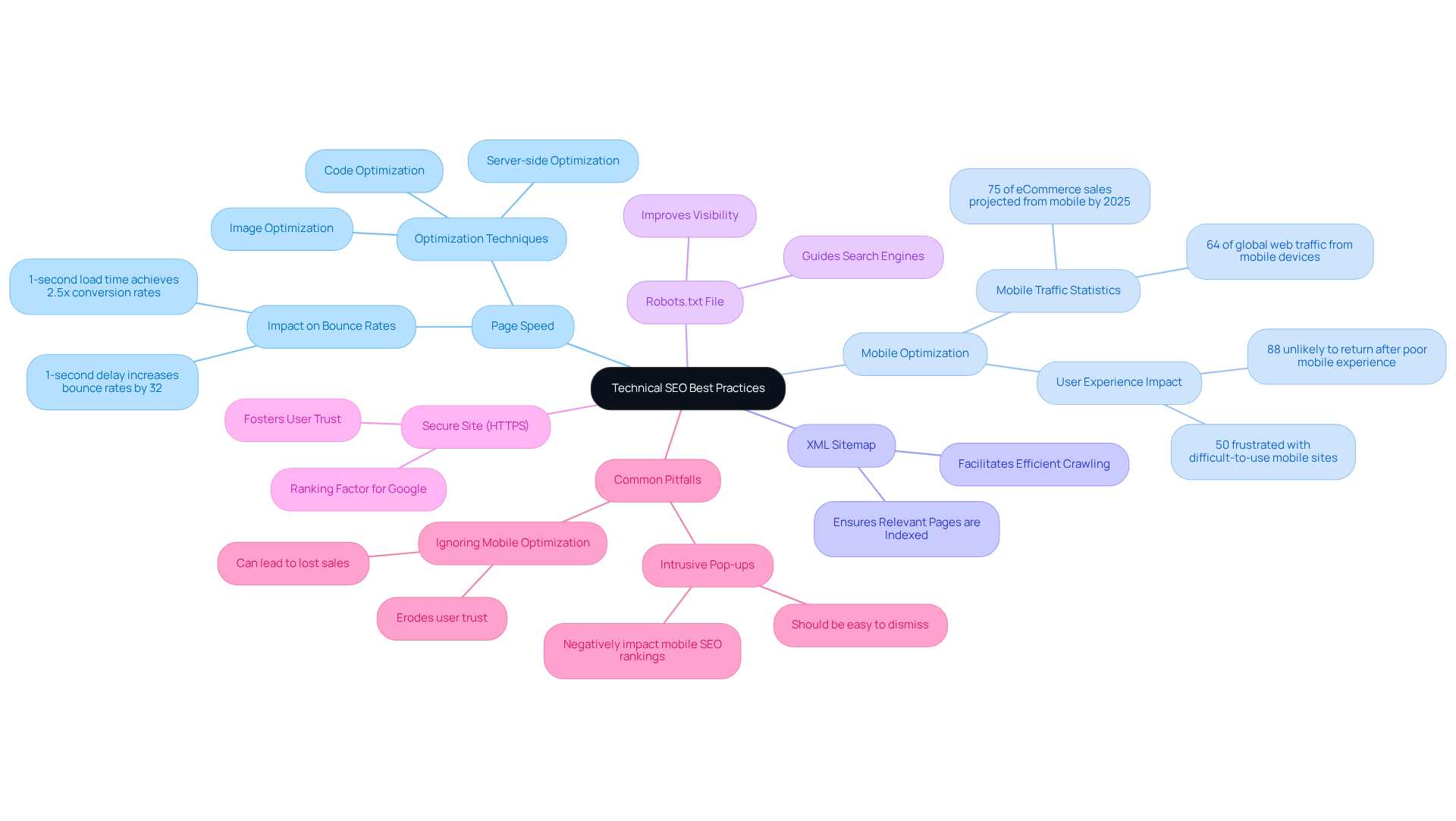
Leverage Content Marketing to Drive Organic Traffic
Utilizing promotional marketing serves as a powerful strategy for driving organic traffic to your ecommerce site. By creating valuable and informative material that resonates with your target audience, you can attract potential customers and establish your brand as an authority in your niche. Consider implementing the following strategies:
- Blog Posts: Craft informative blog posts that incorporate targeted keywords and offer valuable insights related to your products. For instance, a skincare brand could create a post titled 'The Benefits of Using Natural Ingredients,' which not only informs but also engages readers. Research shows that 77% of shoppers are more devoted to brands that provide rewards programs, highlighting the significance of engaging material in fostering customer loyalty.
- How-To Guides: Develop comprehensive guides that assist customers in effectively using your products. This approach not only drives traffic but also enhances customer satisfaction and loyalty. Expert Dean La Grange emphasizes that providing clear guidance can significantly improve customer retention.
- Video Material: Create captivating video content that demonstrates your products in action. Given its shareability, video can significantly enhance your brand's visibility and reach. Successful brands have employed video to boost engagement, showcasing its effectiveness in marketing strategies.
- User-Generated Content: Encourage customers to share their experiences with your products on social media. This not only fosters but also produces genuine material that can attract new customers. Case studies demonstrate that brands utilizing user-generated content experience greater engagement rates and customer trust.
Incorporating these marketing strategies into your SEO ecommerce services can significantly enhance your brand's visibility and draw more organic traffic to your ecommerce platform. Additionally, being aware of common pitfalls in content marketing, such as neglecting audience engagement or failing to optimize for SEO, can help you avoid missteps and maximize your efforts.
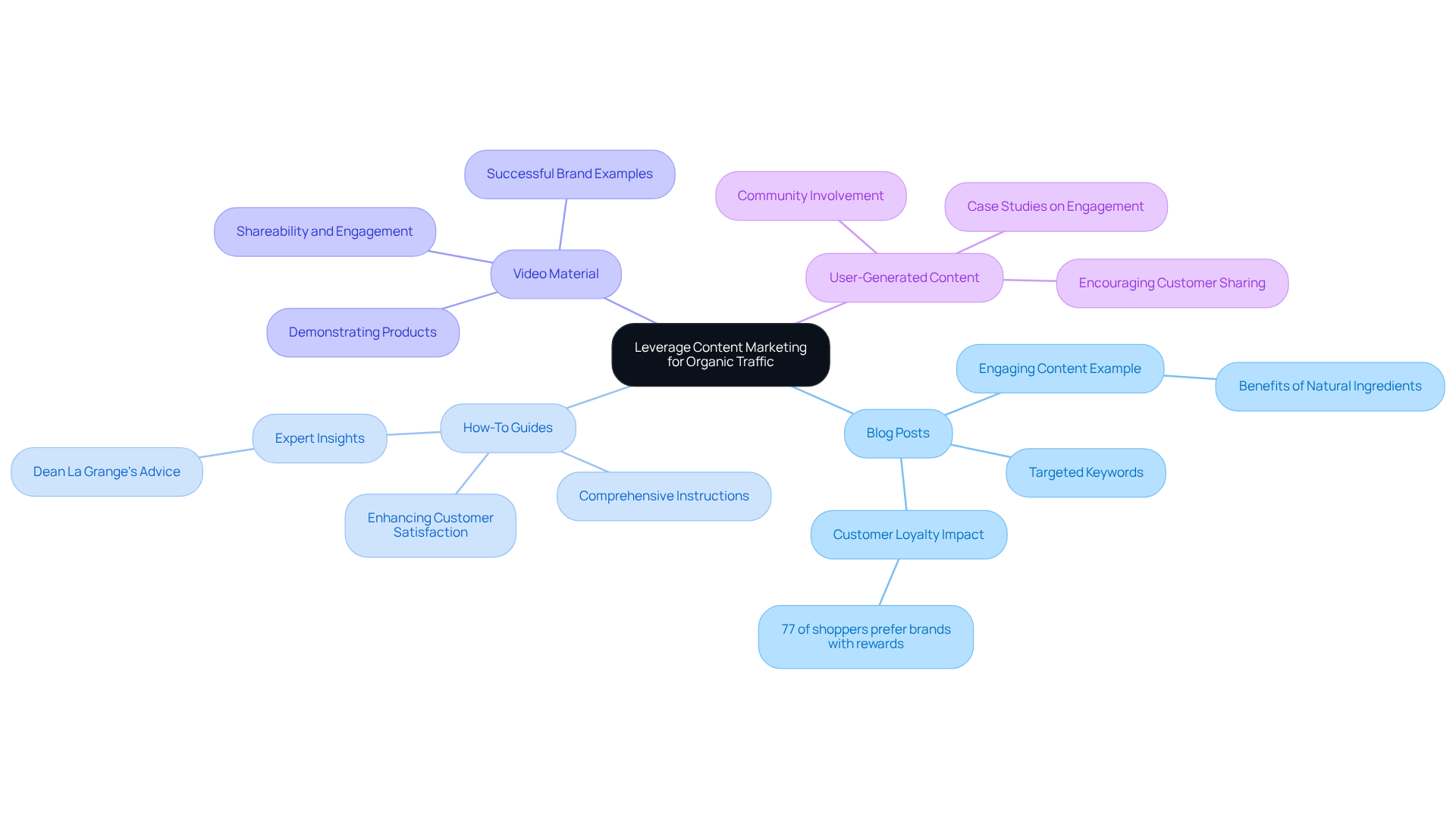
Build High-Quality Backlinks to Boost Authority
Creating high-quality backlinks is essential for enhancing your ecommerce platform's authority and improving its search rankings. To effectively acquire valuable backlinks, consider the following strategies:
- Guest Blogging: Write guest posts for reputable blogs within your industry. This approach not only increases your visibility but also allows you to incorporate backlinks to your webpage, thereby enhancing your authority.
- Influencer Collaborations: Partner with influencers in your niche to promote your products. Their endorsements can lead to valuable backlinks and significantly increase your visibility in the market.
- Resource Pages: Reach out to websites that curate resource pages and propose your material as a valuable addition. This strategy can help you secure backlinks from authoritative sites, bolstering your credibility.
- Social Media Promotion: Actively share your material on social media platforms to boost its visibility and encourage others to link back to it. Engaging with your audience on these platforms can foster organic link-building.
- Create Shareable Content: Develop infographics, research studies, or unique content that others in your industry would find valuable enough to link to. This tactic can naturally over time, enhancing your site's authority.
By prioritizing the development of high-quality backlinks, brands can elevate their domain authority, improve search rankings, and ultimately drive more organic traffic to their ecommerce sites through seo ecommerce services.
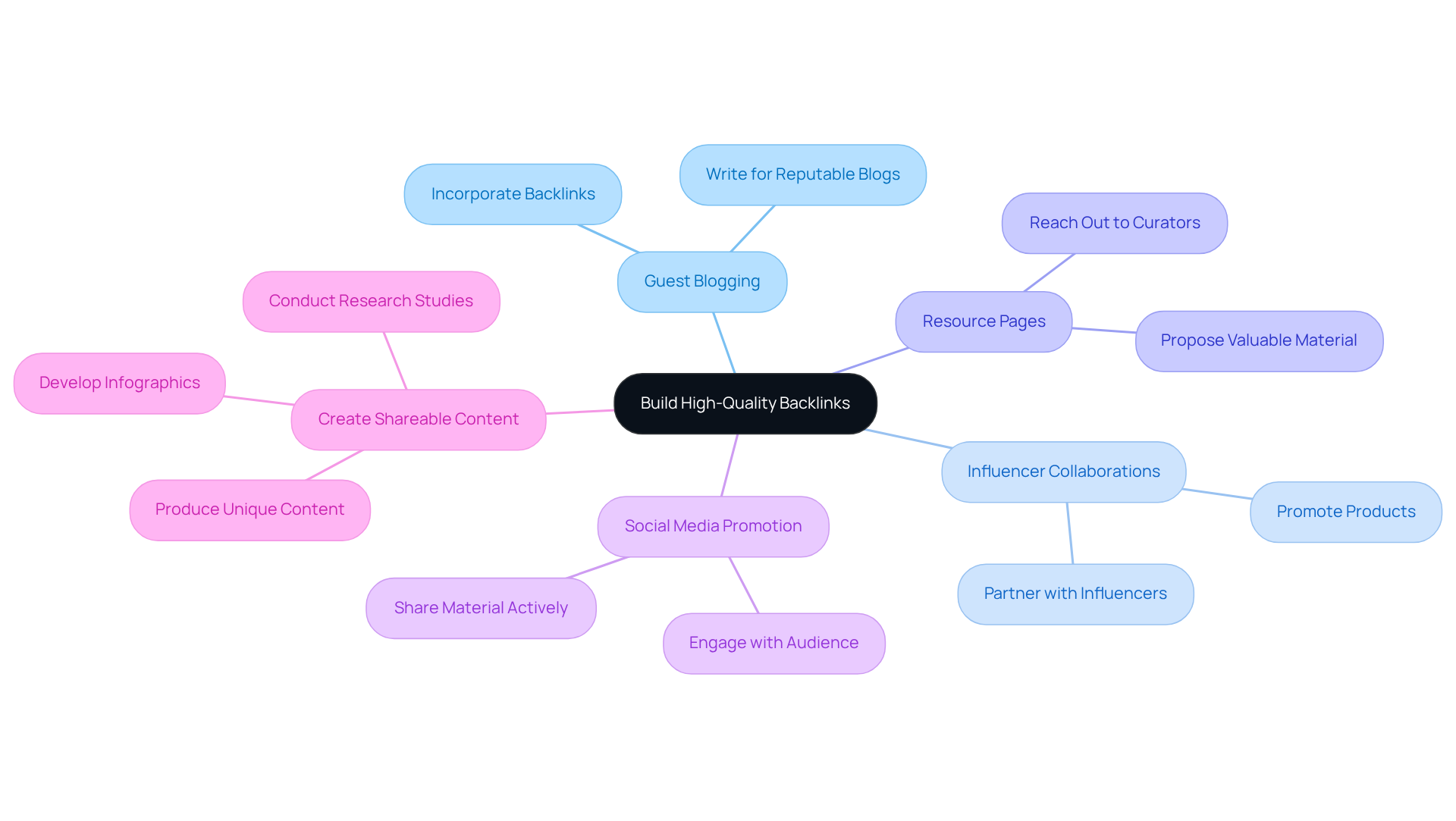
Conclusion
The essence of enhancing an eCommerce brand's growth is rooted in the effective implementation of SEO services specifically tailored for online platforms. By understanding and utilizing these essential strategies, brands can significantly increase their visibility in search engine results, attract the right audience, and ultimately drive sales without the burden of excessive advertising costs.
Key strategies discussed throughout this article include:
- Targeted keyword research
- On-page optimization
- Technical SEO best practices
- Content marketing
- The importance of building high-quality backlinks
Each of these components plays a vital role in creating a robust eCommerce presence that not only draws traffic but also converts visitors into loyal customers. By prioritizing these areas, brands can ensure they are well-positioned in a competitive digital landscape.
The significance of integrating SEO into eCommerce strategies cannot be overstated. As the online retail environment continues to evolve, staying ahead through effective SEO practices will be crucial for long-term success. Embracing these strategies enhances visibility and fosters trust and engagement with customers. Taking action now to optimize your eCommerce site can lead to sustainable growth and a thriving online business in the years to come.
Frequently Asked Questions
What is ecommerce SEO and why is it important?
Ecommerce SEO refers to the strategic enhancement of an online shop to increase its visibility in search engine results. It is important because it drives organic traffic, elevates sales without extra advertising costs, improves user experience, and leads to higher conversion rates.
How can SEO impact sales for an ecommerce business?
Effective SEO strategies can attract more visitors to an online store, convert them into customers, and ultimately boost revenue through increased visibility and a better user experience.
What does attracting the right traffic mean in the context of ecommerce SEO?
Attracting the right traffic involves understanding the target audience and tailoring SEO efforts to meet their needs and browsing behaviors, ensuring that the traffic generated is more likely to convert into sales.
What tools can be used for keyword research in ecommerce SEO?
Tools such as Google Keyword Planner, SEMrush, and Ahrefs can be utilized for conducting keyword research to identify relevant terms and phrases with significant search volume and low competition.
How should keywords be categorized for effective SEO?
Keywords should be categorized based on intent—informational, navigational, or transactional. Prioritizing transactional keywords, which indicate a strong intent to purchase, is crucial for optimizing an ecommerce site.
Can you give an example of a transactional keyword?
Examples of transactional keywords include phrases like 'buy shoes online' and 'discount electronics,' which show clear intent to make a purchase.
How can keywords be integrated into an ecommerce site?
Keywords can be integrated into product descriptions, meta tags, and website content to enhance visibility in search result listings and attract targeted visitors effectively.
FAQs











